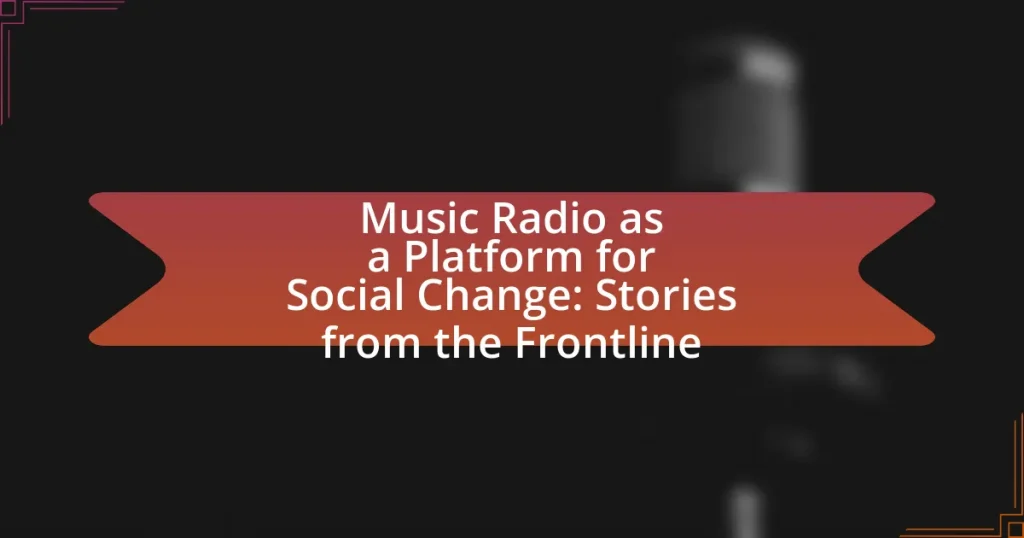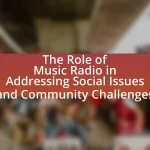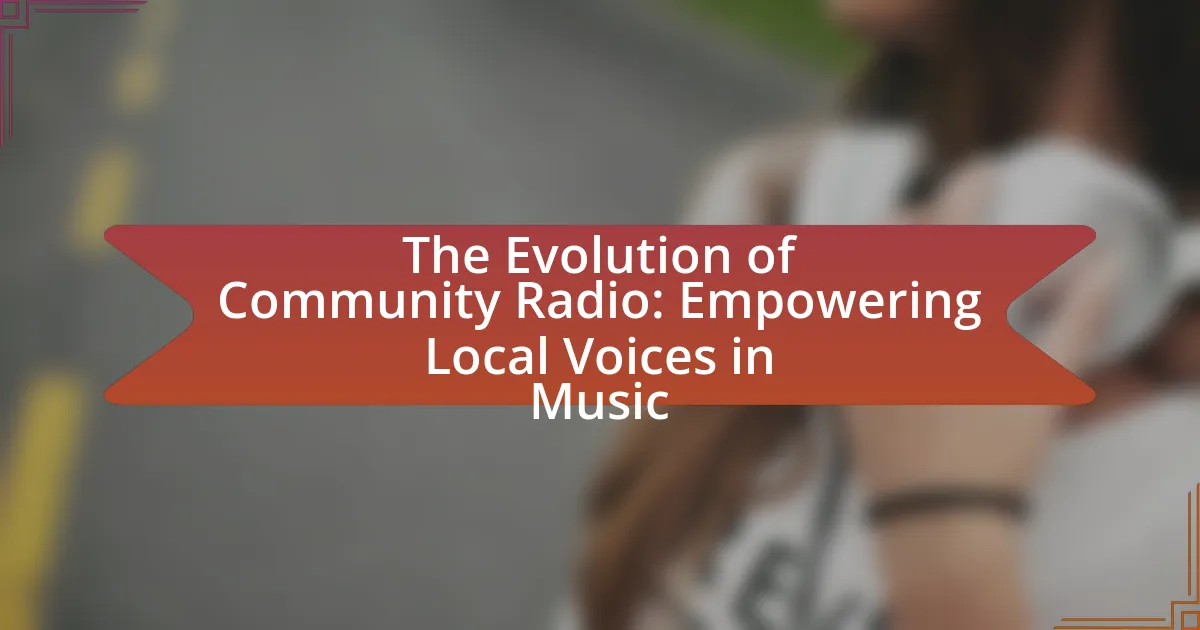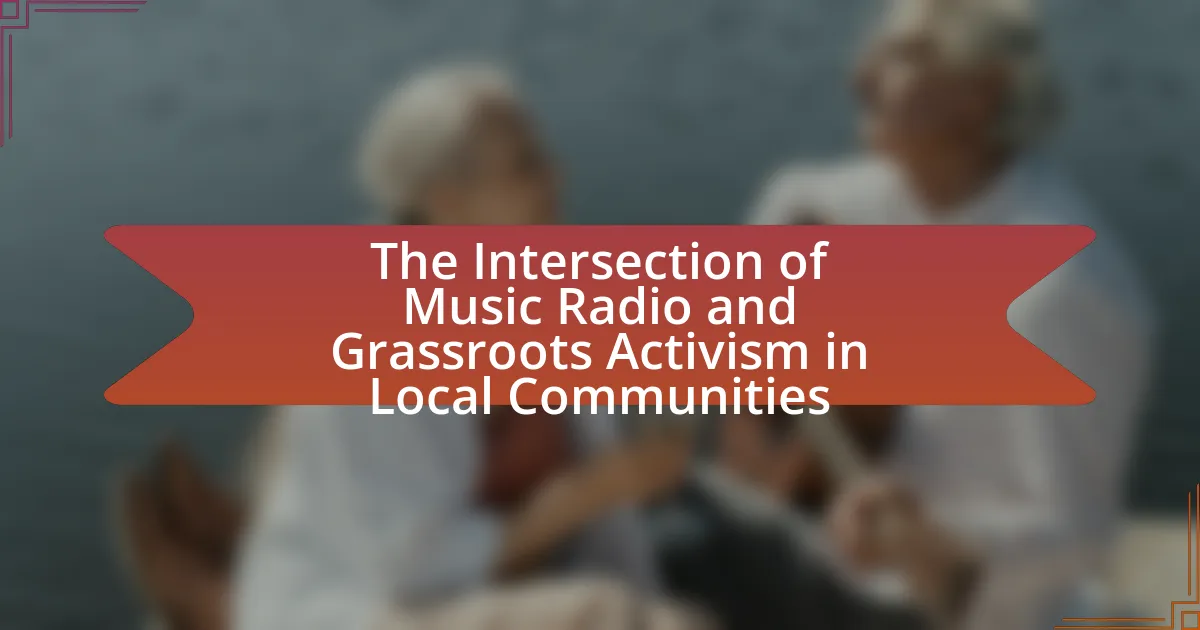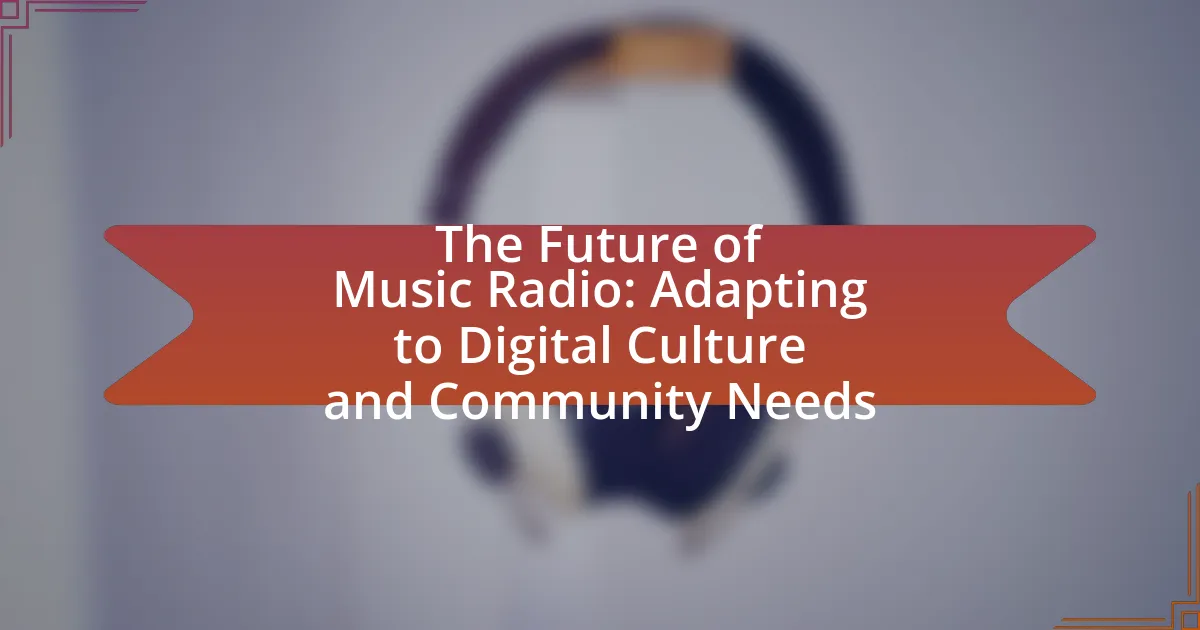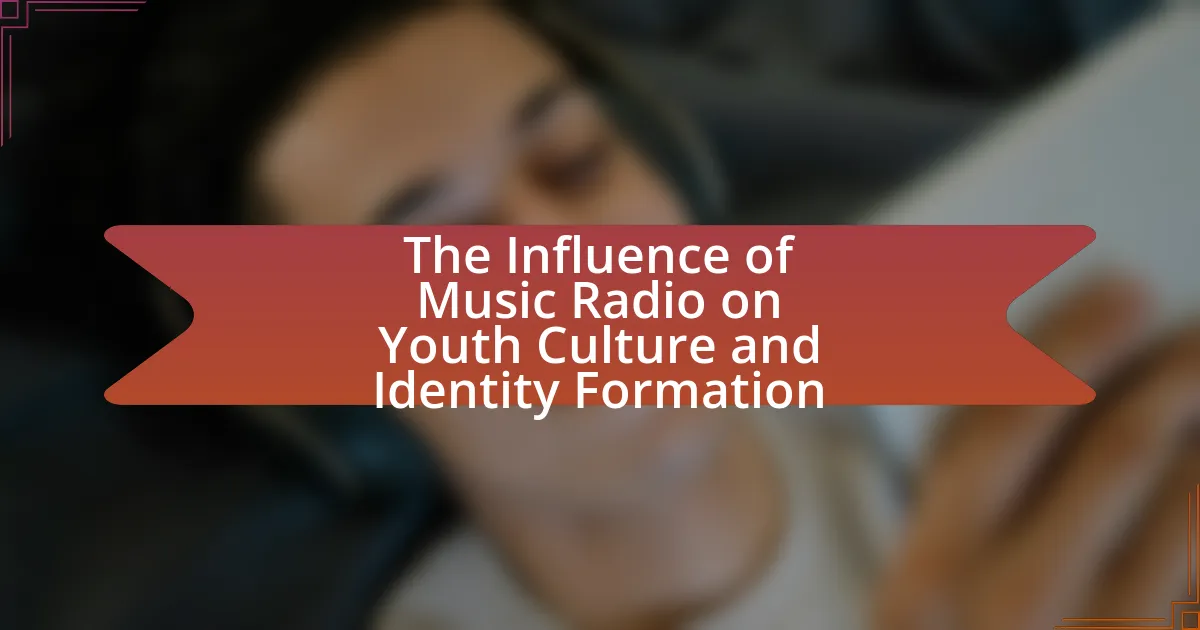Music radio serves as a significant platform for social change by amplifying marginalized voices and addressing critical social issues through music and dialogue. Historically, it has played a vital role in movements such as the Civil Rights Movement and anti-apartheid struggles, fostering community engagement and solidarity. The article explores how music radio influences social movements, highlights historical examples of its impact, and discusses the unique advantages of community radio in promoting social advocacy. It also examines the role of music genres in conveying social messages, the challenges faced by radio stations, and successful initiatives that have led to meaningful change. Through various case studies and listener experiences, the article underscores the transformative power of music radio in shaping public discourse and driving social activism.
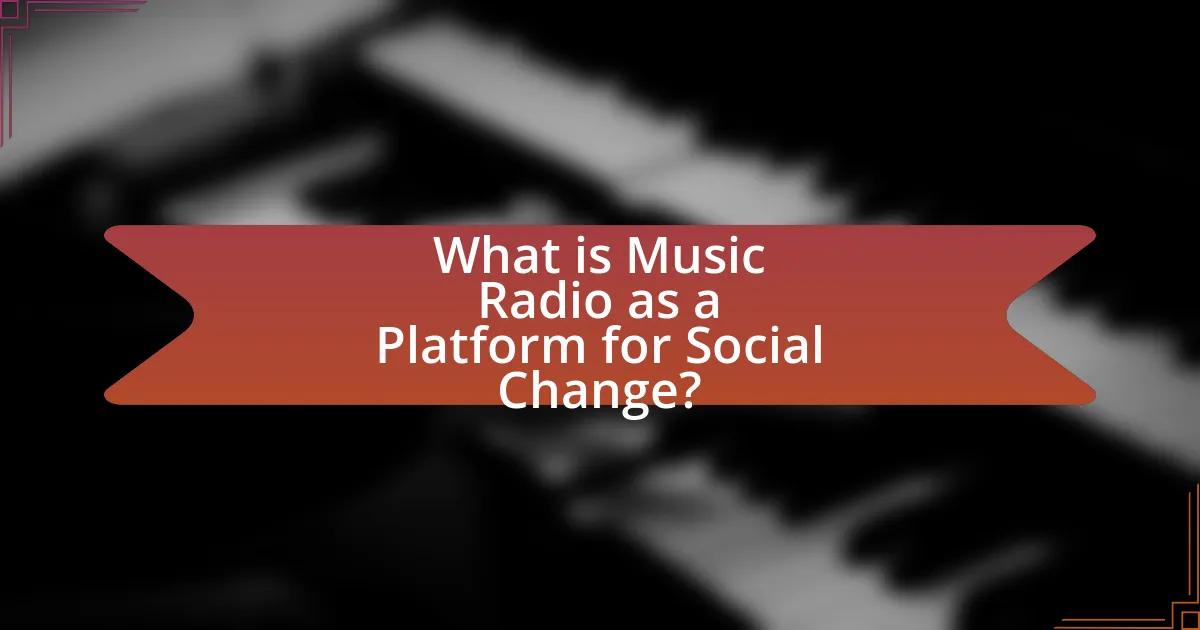
What is Music Radio as a Platform for Social Change?
Music radio serves as a platform for social change by amplifying marginalized voices and addressing social issues through music and dialogue. This medium has historically played a crucial role in movements such as civil rights, anti-war protests, and social justice campaigns, providing a space for artists and activists to share messages that inspire action and awareness. For instance, during the civil rights movement in the 1960s, radio stations featured music that highlighted racial injustices, fostering community solidarity and mobilization. Additionally, studies have shown that music can influence public opinion and behavior, making music radio an effective tool for promoting social change initiatives.
How does music radio influence social movements?
Music radio influences social movements by providing a platform for the dissemination of messages, fostering community engagement, and amplifying marginalized voices. Historically, music radio has played a crucial role in movements such as the Civil Rights Movement, where stations like WERD in Atlanta broadcasted music and messages that inspired activism and solidarity among listeners. Additionally, music radio can create a shared cultural experience, uniting individuals around common causes, as seen during the anti-apartheid movement in South Africa, where radio stations promoted protest songs that galvanized public support. This ability to reach wide audiences and create emotional connections through music makes radio a powerful tool for social change.
What historical examples illustrate music radio’s impact on social change?
Music radio has significantly influenced social change, with notable examples including the role of radio in the Civil Rights Movement and the anti-apartheid struggle in South Africa. During the Civil Rights Movement in the 1960s, stations like Radio Free Dixie broadcasted messages promoting racial equality and civil rights, reaching audiences in the South and galvanizing support for the movement. Similarly, in South Africa, the establishment of Radio Freedom by the African National Congress in the 1960s provided a platform for anti-apartheid music and messages, fostering resistance against the oppressive regime. These instances demonstrate how music radio served as a catalyst for social awareness and mobilization, effectively shaping public discourse and action.
How do music genres contribute to social messages on radio?
Music genres contribute to social messages on radio by providing a platform for artists to express cultural, political, and social issues relevant to their communities. For instance, genres like hip-hop often address systemic racism and inequality, as seen in tracks by artists such as Kendrick Lamar, whose song “Alright” became an anthem for the Black Lives Matter movement. Similarly, folk music has historically been used to convey messages of social justice, with artists like Woody Guthrie advocating for workers’ rights during the Great Depression. These genres not only reflect societal issues but also influence public discourse, shaping listeners’ perceptions and encouraging activism.
Why is music radio considered a unique medium for social advocacy?
Music radio is considered a unique medium for social advocacy because it combines entertainment with the ability to reach diverse audiences effectively. This medium allows for the dissemination of messages related to social issues through music, which can evoke emotional responses and foster community engagement. For instance, campaigns like Live Aid in 1985 utilized music radio to raise awareness and funds for famine relief, demonstrating its power to mobilize listeners for social causes. Additionally, music radio often features artists who use their platforms to address social justice issues, further amplifying advocacy efforts and creating a sense of solidarity among listeners.
What are the advantages of using music radio over other media for social change?
Music radio offers unique advantages for social change compared to other media due to its ability to reach diverse audiences, foster community engagement, and create emotional connections. Music radio can penetrate areas with limited access to the internet or television, ensuring that important social messages reach marginalized populations. Additionally, the interactive nature of radio allows listeners to participate in discussions, share their stories, and engage with content, which enhances community involvement. Studies have shown that music can evoke strong emotional responses, making it an effective tool for raising awareness and inspiring action on social issues. For instance, campaigns that incorporate music radio have successfully mobilized listeners around causes such as public health and social justice, demonstrating the medium’s power to influence public opinion and drive change.
How does music radio engage diverse audiences in social issues?
Music radio engages diverse audiences in social issues by curating content that resonates with various cultural backgrounds and perspectives. Through the selection of music, discussions, and interviews, radio stations highlight social justice themes, such as racial equality, mental health awareness, and environmental concerns. For instance, programs often feature artists who address these topics in their lyrics, creating a relatable platform for listeners. Additionally, music radio frequently collaborates with community organizations to promote events and initiatives, thereby fostering a sense of community involvement and activism. This approach not only raises awareness but also encourages listeners to participate in social change efforts, demonstrating the influential role of music radio in shaping public discourse around critical issues.
What role do community radio stations play in promoting social change?
Community radio stations play a crucial role in promoting social change by providing a platform for marginalized voices and fostering community engagement. These stations often focus on local issues, allowing residents to discuss topics such as social justice, health, and education, which can lead to increased awareness and activism. For instance, a study by the World Association of Community Radio Broadcasters found that community radio can enhance civic participation and empower listeners to advocate for their rights. By broadcasting diverse perspectives and facilitating dialogue, community radio stations contribute significantly to social transformation and community cohesion.
How do community radio stations differ from commercial stations in their approach to social issues?
Community radio stations prioritize social issues by focusing on local community needs and fostering dialogue, while commercial stations often prioritize profit and entertainment value. Community radio engages listeners in discussions about social justice, health, and education, reflecting the specific concerns of their audience. For instance, a study by the National Federation of Community Broadcasters highlights that community radio stations are more likely to provide programming that addresses local social issues, such as poverty and discrimination, compared to commercial stations that typically cater to broader, less localized content aimed at maximizing advertising revenue. This commitment to community engagement allows community radio to serve as a platform for social change, amplifying marginalized voices and promoting civic participation.
What are some successful community radio initiatives that have led to social change?
Successful community radio initiatives that have led to social change include Radio La Benevolencija in Rwanda, which played a crucial role in post-genocide reconciliation by promoting dialogue and understanding among communities. Another example is Radio Zapatista in Mexico, which has empowered indigenous communities by providing a platform for their voices and issues, fostering social and political activism. Additionally, the Women’s Radio Network in Ghana has focused on women’s rights and gender equality, leading to increased awareness and advocacy for women’s issues in the region. These initiatives demonstrate the power of community radio in facilitating social change through engagement, education, and empowerment.
How can music radio effectively address social issues today?
Music radio can effectively address social issues today by serving as a platform for awareness, education, and community engagement. By curating playlists that highlight songs with social messages and featuring discussions on relevant topics, music radio can inform listeners about pressing issues such as inequality, mental health, and climate change. For instance, radio stations like KEXP in Seattle have hosted programs that focus on social justice themes, thereby fostering dialogue and encouraging community action. Additionally, music radio can collaborate with local organizations to promote events and initiatives that address these issues, amplifying their reach and impact. This approach not only raises awareness but also empowers listeners to participate in social change efforts.
What challenges do music radio stations face in advocating for social change?
Music radio stations face significant challenges in advocating for social change, primarily due to commercial pressures and regulatory constraints. These stations often rely on advertising revenue, which can lead to a reluctance to address controversial social issues that may alienate advertisers. Additionally, regulatory frameworks can limit the content that stations are allowed to broadcast, restricting their ability to engage in discussions about social justice or political activism. For instance, the Federal Communications Commission (FCC) in the United States imposes rules that can affect how stations approach sensitive topics. Furthermore, audience demographics can influence programming choices, as stations may prioritize content that appeals to their primary listener base rather than tackling pressing social issues.
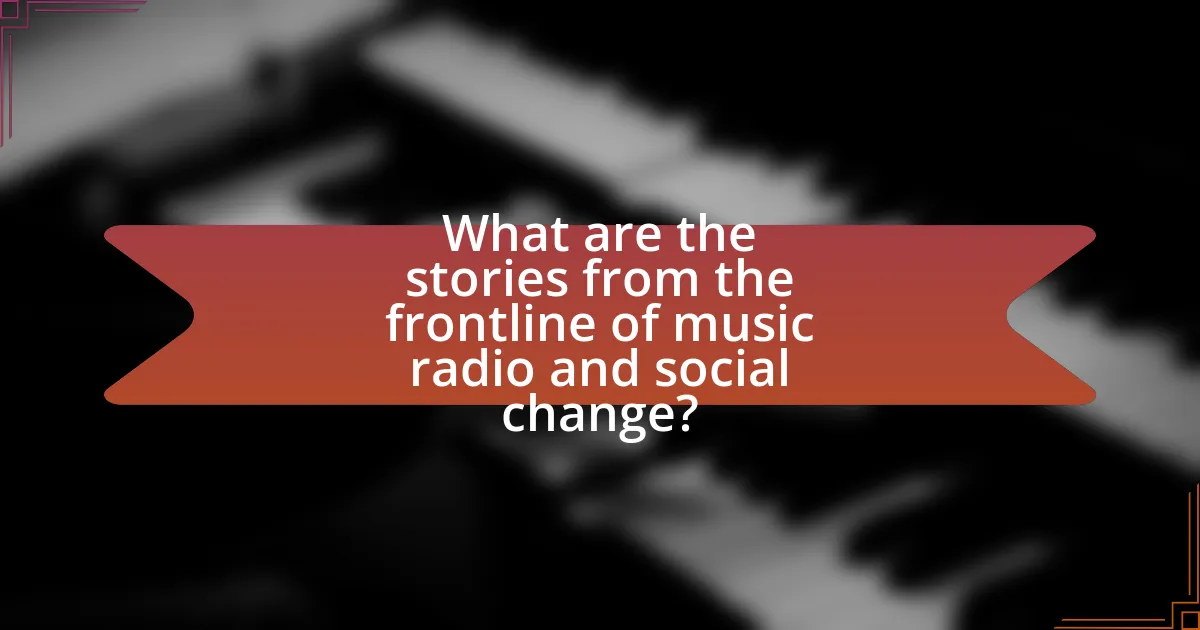
What are the stories from the frontline of music radio and social change?
Music radio has played a pivotal role in social change by amplifying marginalized voices and addressing critical societal issues. For instance, during the Civil Rights Movement in the 1960s, stations like WERD in Atlanta broadcasted music and messages that supported racial equality, significantly influencing public opinion and activism. Additionally, in the 1980s, community radio stations in South Africa used music to unite anti-apartheid sentiments, fostering a sense of solidarity among listeners. These examples illustrate how music radio serves as a powerful platform for social change, providing a voice to the voiceless and promoting awareness of social injustices.
How have specific music radio programs contributed to social movements?
Specific music radio programs have significantly contributed to social movements by amplifying marginalized voices and promoting awareness of social issues. For example, programs like “Radio Free Europe” during the Cold War provided a platform for dissenting opinions and cultural expression in Eastern Europe, fostering resistance against oppressive regimes. Similarly, the “Black Panther Party’s” radio program in the 1960s disseminated messages of empowerment and civil rights, mobilizing communities to advocate for social justice. These programs not only informed listeners but also inspired collective action, demonstrating the power of music radio as a catalyst for social change.
What are notable case studies of music radio programs that sparked social change?
Notable case studies of music radio programs that sparked social change include “Radio Free Europe” and “KEXP’s Song of the Day.” Radio Free Europe played a crucial role during the Cold War by broadcasting music and news to Eastern Europe, promoting democratic ideals and cultural exchange, which contributed to the fall of communist regimes. KEXP’s Song of the Day initiative highlights emerging artists and social issues, fostering community engagement and awareness around topics like racial justice and mental health. These programs demonstrate the power of music radio in influencing public opinion and driving social movements.
How do listeners respond to music radio’s social advocacy efforts?
Listeners generally respond positively to music radio’s social advocacy efforts, often expressing increased engagement and support for the causes promoted. Research indicates that when music radio stations incorporate social advocacy into their programming, listeners report a stronger emotional connection to the station and its content. For example, a study by the Pew Research Center found that 70% of listeners appreciate when radio stations address social issues, leading to a sense of community and shared values among the audience. This engagement can manifest in various ways, including increased listener loyalty, participation in advocacy events, and a willingness to support the causes highlighted by the station.
What personal stories highlight the impact of music radio on individuals and communities?
Music radio has significantly impacted individuals and communities through personal stories that illustrate its role in fostering connection and social change. For instance, in the 1960s, radio stations like WBAI in New York became platforms for civil rights activists, amplifying voices that advocated for social justice and equality. This led to increased community engagement and awareness around critical issues, demonstrating how music radio can serve as a catalyst for social movements. Additionally, in rural areas, local music radio stations have provided a sense of belonging and cultural identity, as seen in the case of KZUM in Nebraska, which highlights local artists and community events, thereby strengthening community ties and promoting local culture. These examples underscore the transformative power of music radio in shaping individual experiences and fostering community solidarity.
How have listeners shared their experiences of change inspired by music radio?
Listeners have shared their experiences of change inspired by music radio through personal testimonials and social media interactions. Many individuals report that music radio has played a pivotal role in their emotional healing, social awareness, and community engagement. For instance, listeners often describe how specific songs or radio programs have motivated them to take action on social issues, such as mental health awareness or environmental activism. Research indicates that music can foster a sense of belonging and inspire collective action, reinforcing the idea that music radio serves as a catalyst for social change.
What role do DJs and hosts play in shaping narratives around social issues?
DJs and hosts play a crucial role in shaping narratives around social issues by using their platforms to raise awareness and foster dialogue. They curate music and content that reflect societal challenges, often addressing topics such as inequality, mental health, and political unrest. For instance, during the Black Lives Matter movement, many DJs incorporated protest songs and discussions about racial justice into their broadcasts, amplifying marginalized voices and encouraging community engagement. This influence is supported by research indicating that media figures can significantly impact public perception and mobilization around social causes, as seen in studies by the Pew Research Center, which highlight the role of media in shaping public discourse.
How can music radio continue to evolve as a platform for social change?
Music radio can continue to evolve as a platform for social change by integrating diverse voices and promoting community engagement through interactive programming. By featuring local artists and activists, music radio can amplify underrepresented perspectives, fostering a sense of belonging and empowerment within communities. Research indicates that radio has historically played a crucial role in social movements; for instance, during the Civil Rights Movement, stations like WERD in Atlanta provided a voice for activists and disseminated critical information. Additionally, incorporating digital platforms allows for broader reach and engagement, enabling listeners to participate in discussions and share their stories, thus reinforcing the role of music radio as a catalyst for social change.
What innovative strategies can music radio adopt to enhance its impact?
Music radio can enhance its impact by integrating interactive platforms that foster listener engagement and community involvement. By utilizing social media for real-time feedback and discussions, music radio can create a two-way communication channel that allows listeners to share their thoughts and experiences related to the music and social issues being addressed. For instance, stations can host live Q&A sessions with artists or experts, encouraging audience participation and making the content more relatable. Additionally, implementing targeted programming that highlights local artists and social causes can strengthen community ties and promote social change. Research indicates that community-focused radio initiatives can lead to increased listener loyalty and participation, as seen in various case studies where local stations successfully mobilized audiences around social issues.
How can technology improve music radio’s reach and effectiveness in social advocacy?
Technology can enhance music radio’s reach and effectiveness in social advocacy by utilizing digital platforms, social media integration, and data analytics. Digital platforms allow music radio stations to broadcast globally, reaching diverse audiences beyond traditional FM/AM limitations. For instance, streaming services and podcasts enable listeners from different geographical locations to access content, increasing engagement with social advocacy messages.
Social media integration facilitates real-time interaction between radio stations and their audiences, allowing for immediate feedback and community building around social issues. This interaction can amplify advocacy campaigns, as seen in initiatives like #MeToo and Black Lives Matter, where radio stations have played a crucial role in disseminating information and mobilizing listeners.
Data analytics further improves effectiveness by providing insights into audience preferences and behaviors, enabling targeted messaging that resonates with specific demographics. According to a report by the Pew Research Center, 61% of Americans have engaged with social media to support social causes, indicating that technology-driven strategies can significantly enhance the impact of music radio in social advocacy.
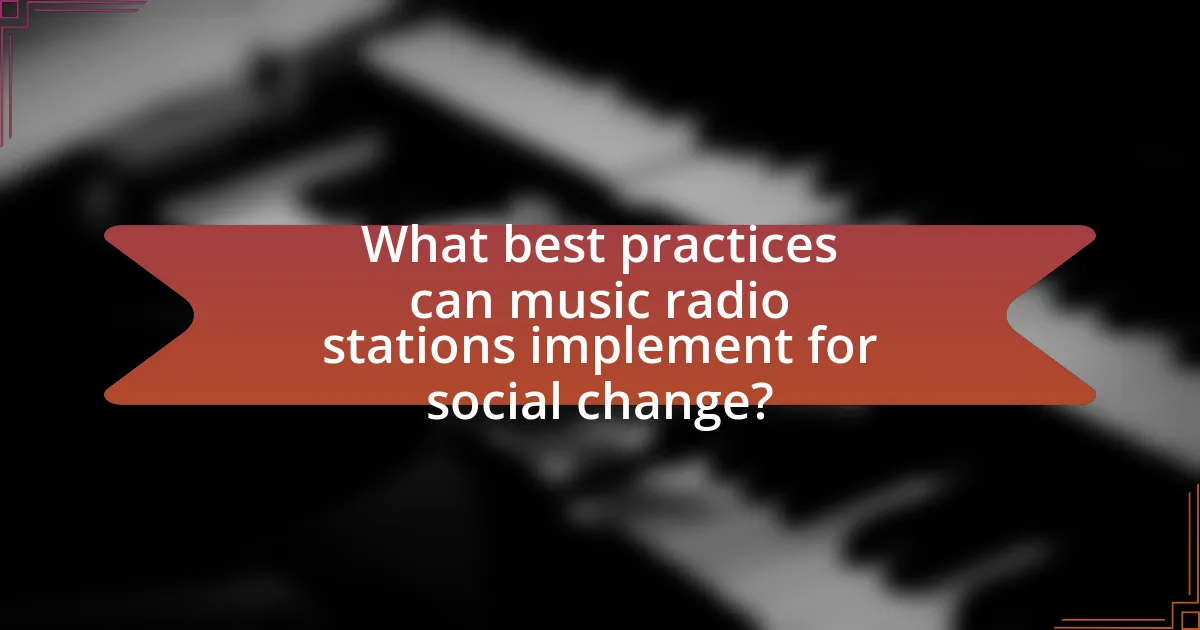
What best practices can music radio stations implement for social change?
Music radio stations can implement best practices for social change by actively promoting diverse voices and addressing social issues through their programming. By featuring artists and genres that represent marginalized communities, stations can foster inclusivity and awareness. Research indicates that radio has a significant impact on public opinion; for instance, a study by the Pew Research Center found that 44% of Americans listen to the radio weekly, making it a powerful medium for advocacy. Additionally, stations can host community events and discussions that engage listeners in social issues, thereby creating a platform for dialogue and action. By collaborating with local organizations, music radio stations can amplify their efforts and drive meaningful change in their communities.
How can music radio stations build partnerships with social organizations?
Music radio stations can build partnerships with social organizations by actively engaging in community outreach initiatives and aligning their programming with the social causes these organizations support. For instance, radio stations can collaborate on events, such as fundraisers or awareness campaigns, which not only promote the social organization’s mission but also enhance the station’s community presence. Research indicates that community engagement can increase listener loyalty and attract new audiences, as seen in the case of KEXP in Seattle, which partners with local nonprofits to promote social justice through music events. This approach not only fosters a sense of community but also amplifies the impact of both the radio station and the social organization.
What types of collaborations have proven successful in promoting social change?
Collaborations between music radio stations, local communities, and social organizations have proven successful in promoting social change. For instance, initiatives like “Songs of Protest” have united artists and activists to raise awareness about social issues, leading to increased community engagement and advocacy. Research indicates that partnerships between media outlets and grassroots organizations amplify messages, as seen in campaigns addressing racial equality and mental health awareness, which have garnered significant public support and participation.
How can music radio stations measure their impact on social issues?
Music radio stations can measure their impact on social issues through audience surveys, social media engagement metrics, and community feedback. Audience surveys provide quantitative data on listener perceptions and changes in attitudes related to specific social issues, while social media engagement metrics, such as shares, likes, and comments, indicate how effectively the station’s messaging resonates with the public. Community feedback, gathered through events or direct outreach, offers qualitative insights into the station’s influence on local social dynamics. For example, a study by the Pew Research Center found that 62% of listeners reported being more aware of social issues after engaging with content from their local radio stations, demonstrating a measurable impact on public awareness.
What are the key takeaways for music radio stations aiming to drive social change?
Music radio stations aiming to drive social change should prioritize community engagement, curate diverse content, and leverage partnerships with local organizations. Community engagement fosters a sense of belonging and encourages listener participation, which can amplify social issues. Curating diverse content ensures representation of various voices and perspectives, addressing topics like social justice, mental health, and environmental concerns. Collaborating with local organizations enhances credibility and outreach, allowing stations to effectively promote initiatives and events that resonate with their audience. These strategies have been shown to increase listener loyalty and drive meaningful conversations, ultimately contributing to social change.
How can music radio stations engage their audience in meaningful conversations about social issues?
Music radio stations can engage their audience in meaningful conversations about social issues by incorporating interactive segments that invite listener participation, such as call-ins, social media discussions, and community forums. These platforms allow listeners to share their perspectives and experiences, fostering a sense of community and dialogue. For instance, a study by the Pew Research Center found that 62% of Americans believe that media can play a significant role in addressing social issues, highlighting the potential impact of radio stations in shaping public discourse. By featuring expert interviews, storytelling, and thematic programming focused on specific social issues, music radio stations can further educate their audience and encourage critical thinking, ultimately driving engagement and awareness.
What resources are available for music radio stations to enhance their social advocacy efforts?
Music radio stations can enhance their social advocacy efforts through various resources, including partnerships with nonprofit organizations, access to community engagement programs, and training workshops focused on social issues. Partnerships with nonprofits provide music radio stations with expertise and credibility, allowing them to effectively address social issues such as mental health, racial equality, and environmental concerns. Community engagement programs, such as local events and outreach initiatives, enable stations to connect directly with their audience and promote social causes. Additionally, training workshops on topics like media literacy and advocacy strategies equip radio staff with the necessary skills to communicate effectively about social issues. These resources collectively empower music radio stations to play a significant role in social change.
